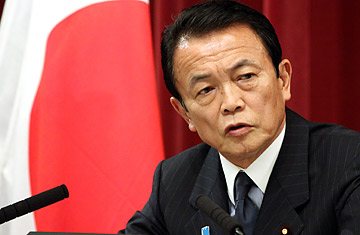
Taro Aso, Japan's prime minister, speaks during a news conference at the prime minister's official residence in Tokyo, Japan, on Friday, April 10, 2009.
Japan's Prime Minister Taro Aso is proving himself to be a big spender. And he, like the rest of Japan, is hoping that spending more on the economic crisis will make it go away. At a press conference Friday afternoon, Aso unveiled $149 billion stimulus package, 50% larger than what Aso ordered up earlier this week and the third stimulus plan he has proposed since he took office last September. The latest package amounts to record spending for the world's second-largest economy — about 3% of GPP — and, if passed by lawmakers, will bring total fiscal spending during the Aso administration to about $268 billion.
The Japan of the future will no doubt be grayer, but also greener if Aso gets his way. His administration plans to channel spending toward four main areas: strengthening a safety net for the unemployed (about $19 billion) and providing financing for small- and medium-sized companies (about $30 billion); improvements in health care, nursing and child care; subsidizing the development and use of solar energy and environmentally friendly technologies; and public-works projects to help regional economies. Revisions to the tax system, including tax cuts, are also included in the economic plan. (See pictures of Japan and the world.)
The fresh spending was unveiled just as a few glints of light broke through the gloom engulfing Japan after months of dismal economic data. Following news on Thursday that employment and cash flow measures would be included in the package, the Nikkei stock index broke 9,000 points for the first time since January and machinery orders, an indication of how much companies are investing, exceeded expectations with a rise of 1.4% over the previous month.
During Friday's press conference, Aso reiterated that Japan "needs to be bold for the short-term and responsible for the medium-term." The government will provide $5.9 billion more to the "employment adjustment subsidy" that helps companies that retain employees. Measures also include $6.9 billion for job training and unemployment benefits. Japan will also increase its loan-guarantee program for small-and medium-sized businesses to $298 billion.
Japan wants to win back the No. 1 spot as the world's top producer of solar cells — a position it recently lost to Germany — and will provide subsidies to companies and households to increase the use and production of solar energy. Japan will also outfit schools with solar panels (with a goal of installing panels on 36,000 schools over three years) and pay consumers to buy greener electronics. Subsidies will also be put in place too encourage purchases of hybrid and electric cars.
The stimulus package is a step toward the realization of an economic growth plan unveiled by Aso on Thursday. His strategy aims to create as many as 2 million jobs and as much as $597 billion in domestic demand over the next three years, with additional gains though 2010. The country's leaders are beginning to realize Japan is on the wrong path. Its flagship manufacturing giants have been pummeled by the crash in worldwide consumer demand. Exports fell by nearly 50% year-over-year in January and February; the economy as a whole is expected to shrink by 6.6% in 2009. "Japan must reinvent its export-driven growth model," Aso said Thursday.
Economists generally see the stimulus package as a positive. But some warn that it might not go far enough in generating domestic demand. Shinichi Ichikawa, chief strategist at Credit Suisse Tokyo, says that the government has failed to articulate "a philosophy to change the Japanese economic structure." The program doesn't do enough to reform the economy so that consumers will save less and spend more on a permanent basis, he says, which means growth will remain overly reliant on the performance of a handful of top companies such as Toyota Motor, the world's largest automaker. "I think it's only big spending by the Japanese government to boost the Japanese economy. The effects of it might be finished within a year."
To fund the new stimulus package, the government will present a supplementary budget to the Diet by the end of the month.
